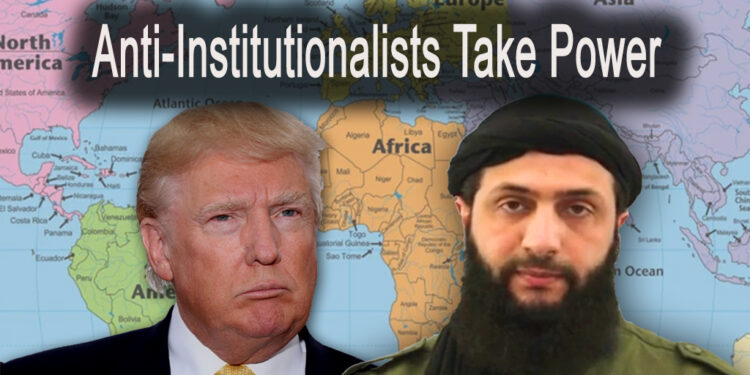by Miceál O’Hurley
DAMASCUS — This New Year two wildly different leaders ascend to power albeit with a homogenous world view as anti-institutionalists. Syria’s new-emerged, self-proclaimed ruler, Hayat Tahrir al-Sham (HTS)’s Abu Muhammad al-Jawlani and America’s MAGA Party leader, Donald Trump claim their displacement of previous leaders and disruption of their policies and governance structures will result in a better world. We need only ask Iraq and Afghanistan how new political leadership tearing down institutions has worked-out for them. Such sweeping aspirations betray that neither is a student of history. The world can only hope those who now must deal with them are.
18th century Irishman and political philosopher Edmund Burke, famous for his axiom, “The only thing necessary for the triumph of evil is for good men to do nothing – Take Action!” was none-the-less cautionary about the practicality of introducing radical change in government and expecting good results. Burke, the then Rector of the University of Glasgow and giant of the waning days of the Scottish Enlightenment, provided sage insights for those hoping 2025 will provide the much-needed stability simply because key actors have changed. Regime change is often more fraught than desired and a desire for lasting, effective transformation is often misplaced.
In his 1790 treatise, Reflections on the Revolution in France, Burke observed how the zeal to denounce, displace or destroy France’s existing institutions created either a vacuum prone to anarchy or replace them with ineffectual and structurally deficient bodies incapable of providing stability or accountability. For Burke and most learned historians, while the French monarchy was undeniably flawed, stripping France of its most functional institutions eventually led to the likes of Robespierre and the mob. In all it proved a failed exercise giving proof to the aphorism that the pursuit of perfection can be the enemy of the good. Still, both Trump and al-Jawlani seem intent on sweeping away significant, extant institutions in the hope their governments will build a shining “city on a hill”.
The question arises – is the world prepared for another collapse of institutionalism?
Trump, a man famed for destroying institutional norms, will this week be found guilty of 34-felony counts before being sworn in to his second 4-year term of office as President of the world’s most powerful democracy. Al-Jawlani, a one-time ISIL leader intent on creating a caliphate that would encompass authority over all the world’s Muslims, now seems intent on nation-state building, holding democratic elections within 4-years and engaging with bodies he once denounced as tools of Iblīs. The coming 4-years assuredly promise much commotion. The outcome remains far less certain.
The fall of the al-Assad regime was long in-the-making but should have surprised no one. Still, the world was left un-prepared. Bashir al-Assad may have employed the same brutal tactics of oppression exercised so skillfully by his father, Hafez al-Assad, during his own despotic reign over Syria but his ability to secure his country over the past 13-years proved lacking. Between the non-aligned opposition including Kurds, ISIL remnants and HTS his regime always teetered on sudden collapse. With the misfortunes of his main supporters, Iran which found itself enmeshed in the decline of Hezbollah and Hamas because of the war in Palestine, and Russia being diminished to the point of having to incorporate North Korean mercenaries in its ground forces operating in Ukraine, it was only a matter of time before al-Asad would find himself denied resources leaving his opponents to unseat him from his stronghold in Damascus.
When regimes change, either by the ballot box or gun, there is rarely a lack of states seeking favour and imparting lavish gifts, or “inducements” as they are often called in speak.
The scramble of states bearing gifts to befriend al-Jawlani and the new HTS regime in Syria demonstrates how ill-prepared the world was to engage with the demise of the al-Assad regime’s half-century of cruel totalitarian administration of Syria. Given the amount of territory under HTS control, surpassing that of the Kurdish and ISIS oppositions, dealing with al-Jawlani is the only real option for governments hoping to capitalise on the flight of al-Assad into Russian exile. The future role states like Türkiye might play given their desire to fulfil their own regional goals may complicate matters but only the future might reveal how that will effect Syria and otherwise elevate the complexity of regional affairs.
Undeniably, the fall of Syria’s al-Assad regime struck a quadruple-blow in the region. Not only did it serve to depose al-Assad but it severely diminished Russia’s role in the region and effectively terminated Iran’s near-hegemony over Syria. It also struck a blow at Iran’s ability to use Syria as a conduit to aid Hezbollah and by extension sustain such significant influence in Lebanon. These realities are undeniable given the witness to Russia forces evacuating with such haste and even Ziad al-Nakhala congratulated the Syrian people writing of their, “respect for the independence, and the political choices of the people of Syria…”. As for Hezbollah, a one-time Syrian Ba’athist party and al-Assad ally, their official encouragement for Syria’s “aspirations for freedom and justice” following al-Assad fleeing to Moscow with all the resources with which he could abscond speaks volumes about the re-alignment of influence in Syria and the broader region.
Still, like al-Jawlani, Trump too has found himself the recipient of envoys and allies beating a path to pay homage like Magi visiting a child in a Bethlehem manger. His former corporate, political and international opponents have been chronicled to be making gifts of millions of dollars to his inaugural celebrations and future presidential library or otherwise co-aligning their policies with his in the hopes of staving off confrontations with the new White House administration. Only the bombastic, reckless and shocking assertions by Trump that the US should take possession of the Panama Canal, Greenland and Canada, by military force if necessary, may stiffen the backs of world leaders more grounded in reality and respectful of international law.
The newly emerged jubilant embrace of both al-Jawlani and Trump may be fleeting. However, the world’s inevitable necessity of dealing with the abundant risk each carries because of their mistrust of institutions may leave both their allies and opponents to deal with the consequences of their actions. It is not lost on informed observes the incongruity of al-Jawlani, the once ISIL commander once bent on destroying all temporal law and institutions in Syria now committing himself to become the author and creator of a nation-state which by definition requires institutions. To the contrary, Trump has dispensed with appointing seasoned professionals tied to long-established US institutions to play pivotal roles in his new government.
Without the institutional wisdom and history carried by professionals as part of his new administration Trump may find chaos when implementing his much-vaunted goals of abolishing the US Department of Education, Federal Bureau of Investigation and abolishing the Federal Deposit Insurance Corporation (which has safeguarded individual deposits without fail since the mass collapse of banks during the Great Depression of the 1930s). Trump’s approach to government as an instrument to wielded in the service of personal goals, even if adverse to national interests, has led him to threaten other states with military force and his personal opponents with legal persecution. No other American leader has approached the Presidency with policies so antithetical to America’s long-vaunted values and ideal than has Trump. Al-Jawlani, like Trump, now find themselves in the position of administering nation-states while being fundamentally opposed to the safeguards and restrains nature and time has introduced into the political structures necessary for their successful administration.
Ultimately, the risk that these mere 2-out-of-195 countries pose to world stability is statistically insignificant. But that is not the calculus at stake. One is disputably the most dominant player on the world stage and the other a lynchpin to setting a region seemingly in perpetual conflict. The stakes are high and the world must prepare for the impending chaos both leaders may bring to international and regional affairs and unlike before the fall of the al-Assad regime, be prepared.
















































